November 20, 2024
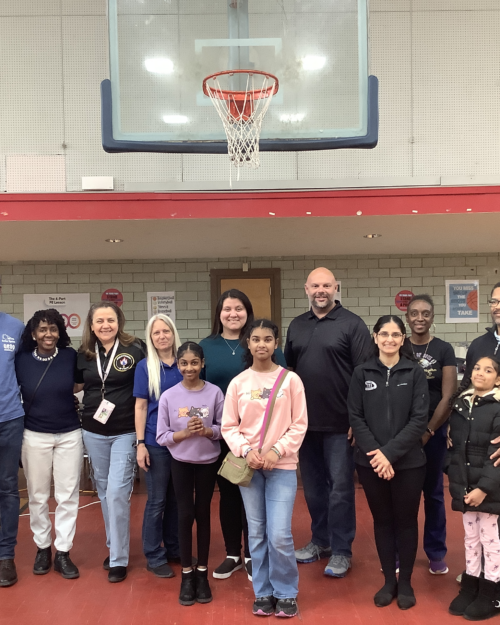
The Junior Solar Sprint (JSS) program isn’t just about racing solar-powered cars—it’s a hands-on opportunity for students to explore engineering, sustainability, and teamwork in action. At the Picatinny Arsenal JSS Chapter, the program is driven by a passionate team of staff who guide students through every twist and turn of the process.
In this blog, we’re highlighting three of these staff members – Mahomet Accilien, Daniela C. Gonzalez, and Mark Maselli. Other engineers like Laverne Hamilton have tremendously helped the chapter along the way. Whether they’re managing race day events, mentoring students through creative challenges, evaluating innovative designs, or celebrating the thrill of race day, their contributions make JSS a transformative experience for all involved. Let’s dive into their stories!
Daniela Gonzalez is a Mechanical Engineer representing the Picatinny Arsenal JSS Chapter. Over the years, she has contributed in various capacities, including judging students’ portfolios, carts, boxes, and presentation skills. Additionally, she has been instrumental in event setup and teardown, ensuring smooth transitions for each competition.
Mahomet Accilien, also from the Picatinny Arsenal JSS Chapter, is an Electrical Engineer with a robust mechanical background. As a co-coach for the East Orange STEM Academy High School in East Orange, NJ, he brings a wealth of knowledge and experience to guide and inspire students in their STEM journey.
Mark Maselli, a Mechanical Engineer, represents the Picatinny Arsenal JSS Chapter as a dedicated judge and mentor. He plays a pivotal role in supporting students throughout the program.
When did you first get involved with AEOP and/or JSS? What made you decide to open or bring JSS to your Army site?
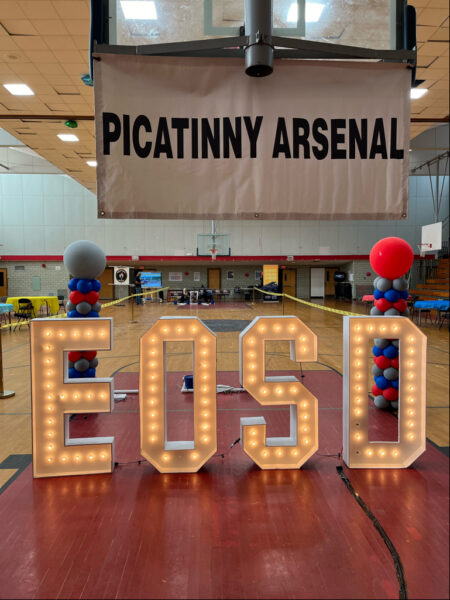 Daniela Gonzalez: I began my involvement a few years ago as an intern representing Picatinny Arsenal. Since then, I have remained actively engaged with the JSS program, continuing my participation for as long as the Army has hosted it.
Daniela Gonzalez: I began my involvement a few years ago as an intern representing Picatinny Arsenal. Since then, I have remained actively engaged with the JSS program, continuing my participation for as long as the Army has hosted it.
Mahomet Accilien: I got involved two years ago when a colleague asked me to represent Picatinny Arsenal at a STEM event at a local school. Seeing the need, I volunteered to coach.
Mark Maselli: This was my first year supporting JSS; however, I’ve been involved with the STEM office for roughly three years through outreach activities. There was a need for judges for the competition, and I jumped in, ready to support. The excitement and help I brought to the event were irreplaceable, providing me with a deeper understanding of the mentorship and assistance that are so needed. I look forward to continuing to support these events and helping students develop essential skills.
What’s one of your favorite memories from your time in JSS?
Daniela Gonzalez: My favorite memories are when the students get excited to race and seeing the teachers, parents, and mentors get super excited about each team making it to the finish line. It creates healthy competition but also fun that everyone can bond over.
Mahomet Accilien: My favorite memory is when, after explaining the concept, they finally get it. Their faces light up, and they’re smiling from ear to ear. Another favorite moment is seeing the satisfaction on their faces when they see the results of their hard work.
What makes you want to continue working with JSS or maintaining the program at your site?
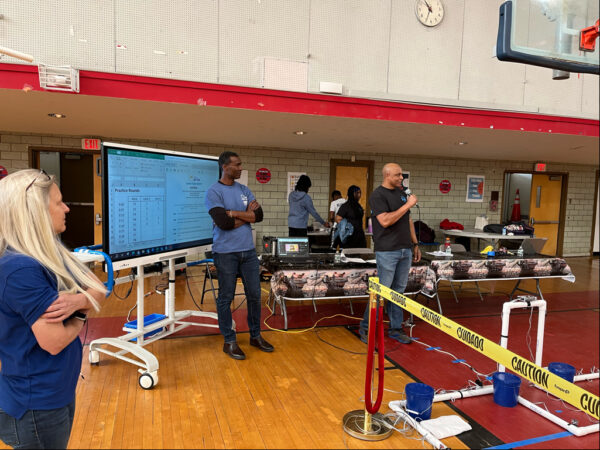 Daniela Gonzalez: I participate in many STEM events, including JSS. I enjoy supporting the program for its ability to reach different communities and bring everyone together. It’s great to see both new and familiar faces at the competition, as well as witnessing kids support other teams when needed. No matter what school or background they come from, they all want everyone to succeed.
Daniela Gonzalez: I participate in many STEM events, including JSS. I enjoy supporting the program for its ability to reach different communities and bring everyone together. It’s great to see both new and familiar faces at the competition, as well as witnessing kids support other teams when needed. No matter what school or background they come from, they all want everyone to succeed.
Mark Maselli: After being exposed to JSS, it reminded me of similar activities I experienced in middle school. We learned about bridge construction and were tasked with designing and building our own bridge, much like designing and constructing a solar-powered car. The skills we gained from these exercises were invaluable, teaching us to consider multiple factors while encouraging us to think outside the box. JSS is one example of how students are exposed to real-world challenges. The excitement students show when something they contributed to works is a powerful motivator that drives them to perform even better. Maintaining JSS and similar programs is essential for preparing students to succeed in their future careers.
What is the best piece of advice you could give to those interested in helping mentor/coach students in JSS?
Daniela Gonzalez: If you’re looking for a sense of community, the opportunity to help grow the next generation with valuable skills, and have fun while doing it, then this is the event for you.
Mahomet Accilien: Jump in with both feet, with no expectations, and do it from the heart. Some students may not be interested at first, but they will come around.
Mark Maselli: There is still a major shortfall in technical and engineering career fields in today’s job market. STEM helps engage these skill sets and gets students involved early, showing them the value of these skills. If you enjoy building things or understanding how things work, this is a great starting point for exploring a career field you could love. Jump in and get exposed to the culture.
What would you say to those interested in AEOP STEM programs or STEM programs in general?
Mahomet Accilien: It’s a great program to get students involved in STEM early, offering hands-on experience while also fostering 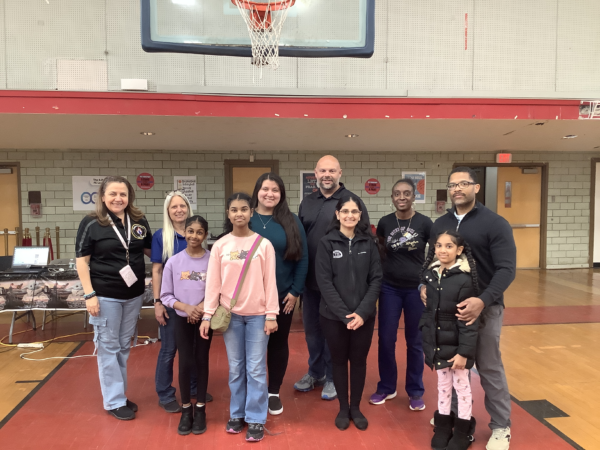 important qualities like teamwork, problem-solving, brainstorming, and refining ideas. Students also develop persuasion skills as they work to rally others behind their ideas.
important qualities like teamwork, problem-solving, brainstorming, and refining ideas. Students also develop persuasion skills as they work to rally others behind their ideas.
Any other thoughts or words of encouragement for those students interested in STEM?
Daniela Gonzalez: Try something first before making a judgment on whether you like it or not—you’ll never know what you’re missing until you give it a try.
Mahomet Accilien: Simple: just do it—get involved. It doesn’t require any prior skills; those skills are developed along the way.
Are there any other things you’d like to share about your JSS experience?
Daniela Gonzalez: JSS brings together the community from public, private, and homeschooling backgrounds, something most other events typically don’t do.
Mahomet Accilien: It’s a once-in-a-lifetime experience—a unique opportunity to mentor the next generation of scientists and motivate them, even if just through the fun of competition. Believe it or not, you’ll experience all their emotions: the joy, the sadness when they fail, the excitement when they fix their car and get back in the race.
Any final thoughts…
Daniela Gonzalez: I am excited to see how we can help expand JSS, reaching not only middle schoolers but also high schoolers.
Mahomet Accilien: I am excited to see the program grow and look forward to the regional competition becoming more competitive.
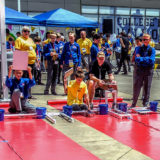
Junior Solar Sprint (JSS)
Junior Solar Sprint (JSS) is a competition for middle school students to create the fastest, most interesting and best crafted solar-vehicle possible.
More About Junior Solar Sprint (JSS)Find a Volunteering Opportunity
Visit our Program Volunteers page for a tool to find the best opportunity for you.
eCYBERMISSION Mini-Grant
The eCYBERMISSION Mini-Grant is intended to support teachers/program leaders as they implement eCYBERMISSION with their teams. Educators (formal and informal) of students in grades 6-9 are encouraged to apply.
